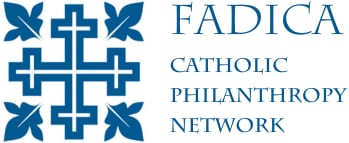Washington, DC — Private foundations with Catholic interests are changing as the first decade of the twenty first century closes.
This, according to trustees and grantees whose viewpoints comprise newly published proceedings, entitled: Reinventing Catholic Philanthropy, released today by FADICA, Inc.
The book, available through FADICA exclusively, gives the public an inside view of the changing practices and perspectives of donors amidst an historic downturn in the nation’s economy, newer outcome driven demands within philanthropy in general, and a greater shared desire to combine philanthropic resources to meet today’s needs within Catholicism.
“… as never before (grantseeking) organizations will be favored where leadership, planning and accountability are outstanding, achievement is evident, and a spirit of collaboration is foremost,” says Francis J. Butler, FADICA’s president, in an introduction to the new publication.
The proceedings are based on an invitation only conference sponsored in late January of this year.
Foundations then asked the advice of a number of prominent Catholic leaders across the country about the most effective grantmaking strategies.
St. Thomas University President, Rev. Dennis Dease, stressed the importance of Catholic philanthropy’s international focus. “Developing bridges between our society and other countries, especially those of Africa,” Father Dease said, “is one area where Catholic foundations can be of special importance.”
Catholic Charities USA President, Rev. Larry Snyder, affirms the trend within foundations to be more socially entrepreneurial, and risk taking, and to take a chance on new concepts in partnering with Catholic charities in a new social venture climate.
Foundation trustees themselves express their opinions as well in the new book, sharing candidly what counts the most when they are approached for support of Catholic sponsored programs.
“The first thing that we look for is leadership,” says FADICA member, Amy Goldman, a principal speaker. “You don’t really fund an organization as much as you fund the leadership to carry and organization’s mission forward,” she added.
Most speakers agree in the 52-page book that foundations should be doing more to help build the capacity and infrastructure of grantee organizations that often suffer from limited resources and staff.
Dr. John Wimmer of the Lilly Endowment, one of the largest U.S. grantmaking organizations assisting religious groups, says, “One of the things we can best do as philanthropists, is help the organizations we work with ask the right questions.” Dr. Wimmer reports that at Lilly, multiple institutions are regularly convened so “they can befriend each other, offer support and guidance, and share their insights and their successes. It begins to build a new network, a new capacity of an organization and a leader within a larger ecology of organizations,” he says.
The FADICA publication offers a rich and stimulating look at new philanthropic trends. Popular author, Bill Somerville, an expert on American philanthropy, shows Catholic foundations how to cut back administrative procedures, personalize grantmaking approaches, and add more fun and creativity to the process of awarding grants.
“I’m arguing to move it forward a little bit, and urge foundation boards to trust their intuition more,” says Mr. Somerville.
Religious Sister of Mercy, Mary Scullion, a champion of the homeless in the Philadelphia area, agrees strongly. “The driving idea,” she says to FADICA foundations, “is that of forming partnerships and relationships. . .If we work together we can do better.”
Copies of the proceedings, Reinventing Catholic Philanthropy may be ordered on this website.


